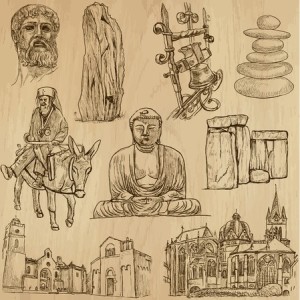Passionately NOT a Bible Translation!
At the beginning of February 2022, Bible Gateway removed The Passion Translation (TPT) from its listing of 90 English-language translations. TPT was first released as a New Testament in 2017 with the intent to “recapture the emotion of God’s Word.” The removal itself raised passions for and against the action by HarperCollins, Bible Gateway’s parent company. Brian Simmons, identified as the lead translator for The Passion Translation by Broadstreet Publishing, provocatively said: “Cancel culture is alive in the church world.” Is this true, or has the church world, beginning with Bible Gateway, simply had enough of Simmons’ outrageous rhetoric?
Let’s focus on the above linked Facebook post, where Simmons alluded to Bible Gateway’s decision as coming from “cancel culture.” There, Simmons referred to an unnamed critic “who paid scholars to trash TPT, so now we’re off.” This unnamed critic is, in fact, Mike Winger, a Calvary Chapel-trained pastor who has an online ministry called BibleThinker. It is “a ministry dedicated to helping you learn to think biblically about everything.” At the bottom of BibleThinker’s homepage is a link for “The Passion Project” that takes you to everything Winger posted on The Passion Translation.
Winger also has a YouTube channel where he streams his podcasts, and on April 28, 2020 he announced the (then) future Passion Project in “I’ve kept this project a secret… until today.” You can watch it from BibleThinker or from Winger’s YouTube channel. He identified Simmons as the sole translator of the work, despite Broadstreet’s assertions to the contrary, which calls him merely the lead translator. He said while it sells millions of copies, TPT has a lot of serious issues. “Believers just a lot of the time are not aware of how much it radically changes the text of Scripture and makes them think that the Bible is saying things that it isn’t saying.”
Winger said in places TPT adds theology into the text that doesn’t belong there; adding words without telling the reader these words or phrases “are not there in the original language.” Simmons says he is appealing to the Aramaic, supposedly to the “original Aramaic”, when there is no original Aramaic that he can appeal to. The New Testament was written in Greek; and nearly all the Old Testament was written in Hebrew. Only 268 verses of the Bible were written in Aramaic.
Its popularity increased dramatically with endorsements from well known, public figures and pastors in what he called the signs and wonder movement. In a post on his Facebook page on December 10, 2020, Winger said: “TPT presents itself as being a translation that does not reflect the views of any denomination or tradition within Christendom. That claim goes a long way toward convincing people that it’s not a skewed version of the Bible.” But the endorsements show that claim was false: “TPT is skewed toward a hyper-charismatic perspective.”
When explaining why he did his Passion Project, Winger said he realized that scholars who have the credentials to look at a translation and say, with some credibility, whether or not a translation like TPT should be used weren’t paying attention to it. I’d suggest that was probably because they didn’t tend to worship at churches in the signs and wonders movement.
These guys are not generally paying attention to The Passion Translation. They’re not interacting with it; they see it as just this sort of weird kind of translation. They’re not really giving it the time of day. But I can get the attention of scholars because of the platform God’s given me online. . . I can reach large numbers of people online. I can create a bridge between the scholarship and the normal people.
It is true that Winger paid several bible scholars to critique specific books of the Bible, such as the Song of Songs, Galatians, Ephesians, Romans and 1 Corinthians. He thought he could get some scholars to evaluate and produce a significant number of papers dealing with TPT. His plan was to hire a number of well-respected scholars, “And have them each evaluate different books of TPT. They’re going to each write papers on their evaluations.” Winger planned to give those papers to his audience for free, which he did do (see them on BibleThinker). He also put together video interviews with each scholar, “where they summarize … as objective as possible, their conclusions about TPT.”
He thought that would be the kind of resource that would answer all the questions someone may have about TPT. Because the critique would be coming from different scholars, “who all have credentials in their fields and they even specialize in the books that I’m assigning to them to do … you can’t think that it’s the bias of one individual.” He added that Brian Simmons and his supporters tended to dismiss critiques by saying the person has an axe to grind; or they don’t believe in the gifts of the Spirit; or they paid scholars to trash TPT. Winger said: “I believe in the gifts, so you can’t apply that to me. But that is the accusation that comes out.”
Winger noted there have been a few scholars who have critiqued TPT, typically saying “pretty negative things about it.” What has happened is Brian Simmons changed the translation in order to dodge the criticism. He calls it a dodge because while Simmons changes the examples pointed out by the scholars, he doesn’t change the problem throughout the translation. So, this means that an individual paper, even presented by a credible scholar, misses the mark. “Because, six months later there’s a new addition to The Passion out and it doesn’t have those verses that were critiqued.”
“By having scholars analyze multiple different books, showing that there’s not just a few weird verses, but there are pervasive problems with the translation that’s going to get the job done.” One of the most disturbing claims made by Simmons is how he was specially chosen by God for this translation project.
Winger said (in Everything Wrong With The Passion Translation in Colossians), “In my opinion, this is a fraud that has been perpetrated on the people of God, and it’s making one man very rich and famous, while changing God’s Word so much, that it is becoming the word of Brian Simmons.” Simmons claims God supernaturally gave him the spirit of revelation and secrets of Hebrew and Greek that he put into TPT. That he is unlocking the Bible and bringing revival. Simmons says,
It wasn’t a dream. It was a wonderful encounter I had at two in the morning, in an upstairs bedroom, where the one I love came and gave me this commission to do the translation process. He breathed on me so that I would do the project; and I felt downloads coming. Instantly, I received downloads. It was like I got a chip put inside of me. I got a connection inside of me to hear Him better; to understand the Scriptures better. And hopefully to translate. He promised He would give me new understanding, and new, fresh revelation from His Word. And immediately, He gave me downloads. Immediately, I began to receive a supernatural download of insight and revelation that has continued to this day. I had a visitation and I was given the commission by the Lord as He breathed on me, and released me; and called me to translate the Bible. I discovered and uncovered so many mysteries and glory realms in the book of Psalms, it will take your breath away. I believe God gave me the key to the book of Proverbs. The Lord showed me it’s the homonymic structure of Hebrew that is going to be the key to understanding revelation in the last days, including the book of Revelation, which you haven’t gotten yet, honestly. I’m mega understating it. God really helped me do this translation. He promised that he would give me secrets that had not been disclosed; the secrets of the Lord. He’s beginning to share them with me and I’d like to share them with you. I’ve made some discoveries … I don’t know who to talk to. I mean I’m finding out all the secrets and translating. Every time I open the Bible, I get fresh insight. It speaks to me; it goes beyond the mind. I get dreams and revelation from the Lord, that is clear and prophetic. So, I believe … I got baptized in the spirit of revelation in that library room of heaven. And He’s revealing Himself in this hour like never before. The Word of God is coming alive to us. It’s like we’re getting a brand new bible, isn’t it.
The above quotes were excerpted from various videos that Mike Winger has of Brian Simmons sayings these things. Not textual quotes, but video of various talks Simmons made. They are in the “Everything Wrong With The Passion Translation in Colossians” video available on BibleThinker. Alex Hewitt concluded in that video, that “Simmons has so radically altered the text of Scripture, that what you have, is not Scripture in your hands. It contains scriptural truths; it contains many of the ideas that the Bible communicates, but what you’re holding in your hands does not qualify as Scripture.”
The publishers of TPT, Broadstreet Publishing, make the claim that Brian Simmons is a linguist, who co-translated the Paya-Kuna New Testament for the Paya-Kuna people of Panama. But Simmons is not a linguist and he did not help translate the New Testament into the Paya-Kuna language. In this short YouTube video, “Is Brian Simmons Qualified to Make the Passion Translation?,” he claims to have had some linguistic training, but he didn’t. Don Pederson of Ethnos 360, the new name of New Tribes Mission, said, “Brian is not a linguist of any sort.” He was a church planter; not a translator.
Jerry McDaniels of Ethnos 360 said, “Nobody in our mission would ever say that he’s a bible translator or was approved as a bible translator.” Simmons said they had completed their translation work by the late 1980s, but the Paya-Kuna NT was not published until 1995. The Paya-Kuna translation was not completed while Simmons served with NTM. Pederson said, “Brian was not what he claimed and that NTM/Ethnos 360 did not agree with his doctrinal positions nor did we follow his approach to translation.” He added to Mike Winger:
My wife and I knew Brian and his wife Candy when we were in missionary training together in 1977. As you surmised, Brian is not a linguist of any sort. Even back then, he was prone to go on fringe doctrinal detours. It was because of this that he left NTM back in the 80’s (possibly dismissed—I’m not certain).
In “Bible Gateway Removes The Passion Translation,” Christianity Today wrote Simmons and his wife helped develop a new Bible translation, but not to the extent he alleges. The bottom line is Brian Simmons is not what he claims to be and the TPT is not really a translation. Bible Gateway had good reasons to justify its removal. Some of the scholars you can listen to on BibleThinker hesitate to even refer to it as a paraphrase. Please do not take my word for it, listen to them.
Listen to some of the video interviews with the biblical scholars; read some of their papers. Listen to some of Winger’s other TPT videos. Do this particularly if you have been drawn to TPT. All Scripture is God-breathed, according to 2 Timothy 3:16. The Passion Translation does not rise to that standard.
Originally posted on February 15, 2022.









